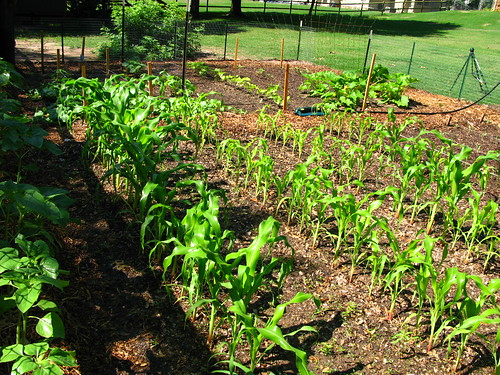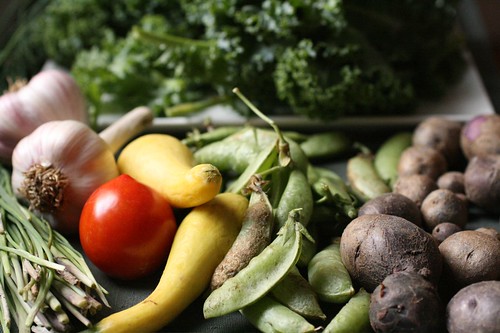Showing posts with label gardening. Show all posts
Showing posts with label gardening. Show all posts
Organic Gardening Video Tips 2
Organic Gardening Video Tips 2

Organic pest control - Natural bug and insect repellents
Soil Testing the Easy Way
Soil Test Kit and How To
How To Make an Indoor Worm Compost Bin

Organic Gardening Video Tips 2
Organic Gardening for Beginners You Can Start An Organic Garden Too!
Organic Gardening for Beginners You Can Start An Organic Garden Too!

As you may have knew or guessed it, organic gardening does not involve the use of chemical fertilizers which reduces the risk of Cancer, Birth Defects, Infertility and many other health problems.
Many know of such problems but they do not want to prevent it UNTIL it happens to them. Sad, isnt it? You may argue that money is important than health or equally important.
What Im trying to convey is, dont wait till the problem happens to you and then prevent it but prevent it before it happens to you. I hope Im not confusing you. That is why I would say go organic now.
I cant stress the importance with words.
To learn how to start your own organic garden with detailed step-by-step guide within weeks, click on the link below because even you as a beginner can start an organic garden too!
As you see in the photo above you can have your vegetable garden as big or as small as you want it to be.
==> http://bit.ly/i4pQIZ
Vegetable Garden photo by Salvadonica, Chianti, Tuscany

Organic Gardening for Beginners You Can Start An Organic Garden Too!
Healthy Happy Herbs A Beginner’s Guide To Herbs and Herb Gardening
Healthy Happy Herbs A Beginner’s Guide To Herbs and Herb Gardening

Initially, I thought, “How hard could it be to keep a small herb garden?” Herbs are known to be hardy plants. The purportedly don’t need a lot to thrive – just provide them with sufficient sun and water. They can be grown in farms as comfortably as in apartments.
So imagine my chagrin when I walked into a garden supply shop and found 1,001 choices and not knowing exactly what I need! From soil selection, herb selection, choosing whether to get seeds or seedlings, fertilizer types, container types and so much more – I wasn’t prepared to make so many decisions all at once. The fight or flight reflex kicked in and I decided to take flight and do some more research.
That’s when I came across Jeannie Woods’ book called “Healthy Happy Herbs: A Beginner’s Guide To Herbs And Herb Gardening”. I was pleased to find that the book was easy to follow, even for someone like me who have zero gardening background. Not only that, it extensively covered all the relevant points that I need to understand to be able to make competent choices – from seed selection, to soil preparation, to harvesting and much more. It even covers composting and ways to care for your plants organically and economically at the same time.
I’ve been following the book’s advice for over a month now. While it’s still early to say if my plants are going to make it, I have a pretty good feeling that they will. What the book couldn’t prepare me for though was how much joy I’m getting out of caring for my small patch of garden (box is more like it, actually), which I totally did not expect.
Another great thing from buying this book – the freebie which I am absolutely enjoying. When I bought this book, it came with a bonus cookbook, which is all about cooking with herbs! The recipes are great. And it made it easy for me to choose exactly what kind of herbs I want to grow.
So, if you’re thinking of cultivating your own herb garden, be sure to check out Jeannie Woods’ “Healthy Happy Herbs: A Beginner’s Guide To Herbs And Herb Gardening”. It’s available exclusively at her book’s website at Happy Healthy Herbs. You’ll be glad that you did.
Photo attribution thebittenword.com

Healthy Happy Herbs A Beginner’s Guide To Herbs and Herb Gardening
Organic Food Gardening Basics
Organic Food Gardening Basics

Before planning to start an organic garden, few basics have to be understood by every beginner. The biggest advantage in doing organic gardening is that it requires less maintenance, less time and cost. By understanding few guidelines and with the help of some basic advice any person can start organic gardening.
The first important thing needs to be considered for planning an organic garden is soil. The soil meant for the organic gardening must be healthy. One must testify the soil from a recognized soil lab before it is being used for the organic gardening. The Soil experts test the soil and will give you assurance about the quality of the soil and whether it can be used or not. Next step towards organic gardening is adding nutrients to the soil such as organic fertilizers etc.
One the most important nutrients that should be added to the soil are compost. The compost can be prepared in our garden or can be purchased from the market. There are some techniques for selecting the best compost; the fast compost is the most popular. By using fast composting technique the soil gets prepared within six to eight weeks. The other techniques of compost consume lot of time, so fast composting is recommended.
Tilling of the soil is done after the soil is ready for use. One can go for the option to till soil by hand or use technology like Machines. Hand tilling is considered much effective. After the soil has been tilled, next step is to sow the garden with organic seeds.
The last step is controlling those weeds and pests by using insecticides, organic pesticides and herbicides. All these above steps and guidelines can be further known by visiting the site myorganicfoodgarden.com that shares some more tips on growing your own healthy organic garden. Remember having an organic garden is not only risk free from harmful chemicals but also healthier to the body. So, why not visit the site and gather further information about organic food gardening.
photo source Oakley Originals

Organic Food Gardening Basics
Organic Gardening For Beginners
Organic Gardening For Beginners

One of the main things I remembered her teaching me was to always eat fresh fruits and vegetables. For which it is now called, organic food. Here are some of the benefits and what you need to do to start your own organic garden.
What you need to do before you begin your organic garden
1. You need to decide how big you want your garden to be.
2. Try not to make it no more than you can handle by yourself.
3. And this is very important!
You need to find the best place that has the most sunlight. The more sunlight the bigger and juicier your plants will be.
4. You need to find out if the soil you are going to grow your garden in is rich soil. If not then you will have to buy top soil to mix with your soil. You can always make a bed or buy sturdy 6 mil plastic - pre-punched drainage bag with holes.
This sometimes is easier, you just fill with grow media, plant your seeds and your garden is ready to go! Depending on how much space you are using depends on how many bags you will need.
5. Decide what is going to be in your garden. Tomatoes, onions, carrots, string beans and so on.
Organic garden tools you will need
In this Essential Garden Tools video you will see a bunch of tools you might not need if your doing a small garden.
Benefits from an organic garden
1. Save money! It is much cheapper to grow your own fruits and vegetable than it is to buy from the super market. No middle man and seeds can be as little as five cents.
2. Fresh fruit and vegetables. NO chemicals or prservatives.
3. Healthy. When you eat organic food. It helps ever cell in your body. From your hair to your toe nails.
Take a look at the other videos on the side bar for more tips and there are helpful introduction ebooks as well.
To your organic gardening success,
Bronzi
photo source thebittenword.com

Organic Gardening For Beginners